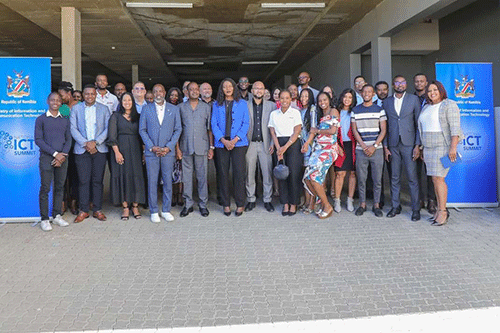The seventh national information and communication technology (ICT) summit, which had been postponed for three years due to Covid-19, was finally launched yesterday in Windhoek by ICT minister Peya Mushelenga.
The summit’s main objective is to provide the ICT industry a place to discuss current trends and issues the industry is facing, both locally and globally. The summit is slated for 9 to 11 October, 2023, with some 400 participants anticipated.
It aims to convene industry leaders, government officials, specialists, and innovators to discuss cybersecurity issues and opportunities, exchange knowledge, and set Namibia on the path to a secure and successful digital future.
Generous summit sponsors, who had contributed a total of over N$500 000, filled yesterday’s launch event which is set to take place under the theme ‘Rethinking Cybersecurity Investment to Secure the Digital Economy and its Opportunities’.
“The digital economy holds tremendous promise for economic growth, innovation and social development. However, it also exposes us to new risks and vulnerabilities that must be effectively managed. The transformation into cyberspace has not only improved the working culture of public and private institutions, but it has also brought challenges that necessitate us to prioritise the security and integrity of our digital infrastructure,” said Mushelenga.
He added that as long as cybercrimes are perpetrated against people, property, and the government, cyber risks would continue to evolve dramatically. According to him, unauthorised software and spyware have found their way onto the devices of unsuspecting users, and fraudulent actions are conducted online.
Additionally, some people have become the targets of scams, blackmail, bullying, and the malicious leaking of private information.
Mushelenga noted that an integrated strategy including all stakeholders is necessary for the successful implementation of cybersecurity.
“We must foster partnerships between the government, industry, academia, and civil society to build a resilient and secure digital ecosystem. Together, we can develop comprehensive strategies, share best practices and enhance our collective cybersecurity capabilities,” he continued.
In addition, the minister emphasised the importance of making investments in cutting-edge technology, developing a competent workforce, and fostering a culture of cybersecurity awareness. He concluded the launch by urging Namibians to embrace ICT’s potential, emphasise cybersecurity, and collaborate to bring about digital transformation for the country’s prosperity.
Moreover, the National Cybersecurity Strategy and Awareness Creation Plan (2022-2027) was unveiled earlier this year by MICT deputy minister Emma Theofelus.
The goal of the Cabinet-approved strategy was to protect the country’s essential information infrastructure. It also aimed to promote cybersecurity cooperation and awareness in order to continually raise internet users’ sense of security online.
Theofelus asserted at the time that the nation’s capacity to carry out its development agenda may be adversely affected by the growing problem of cybercrime, and she added that technology platforms must be safeguarded and that those who are most vulnerable must be made aware of the dangers of the internet.
She claimed that the ministry recognised the necessity to create and carry out the strategy as a result.


